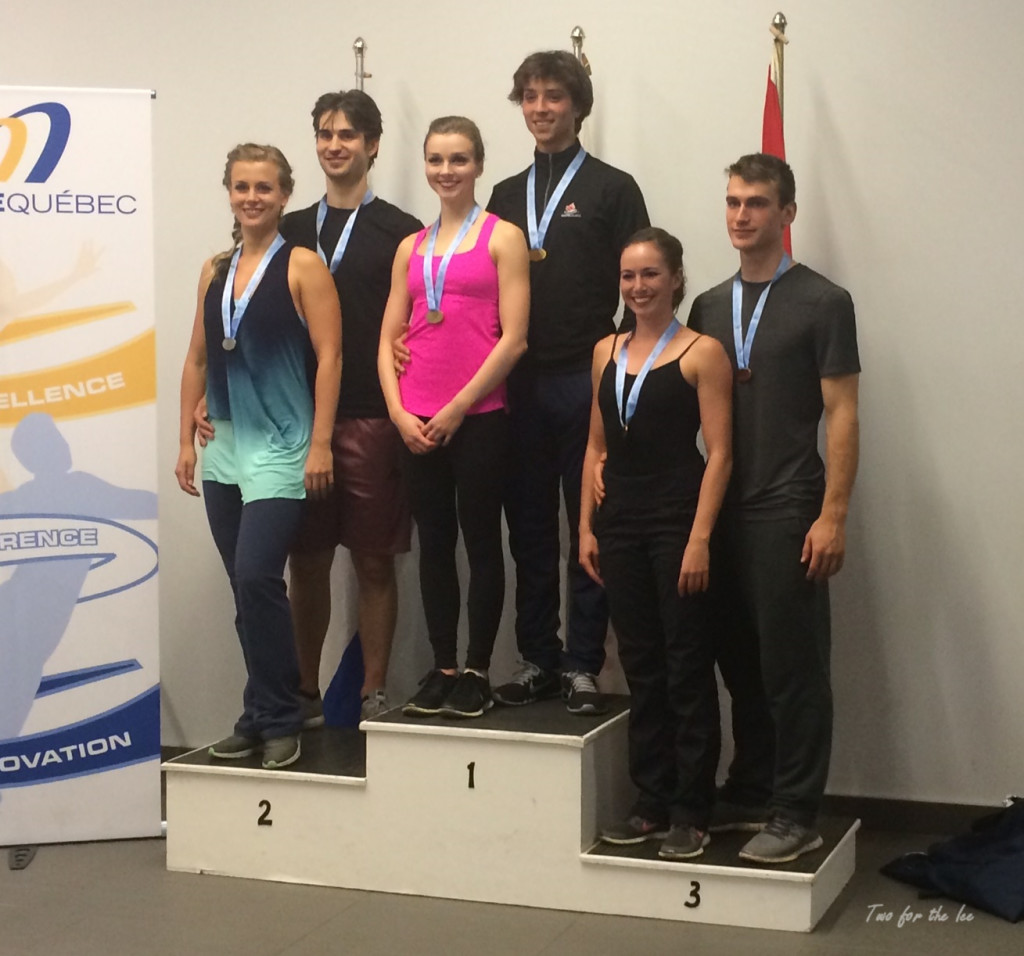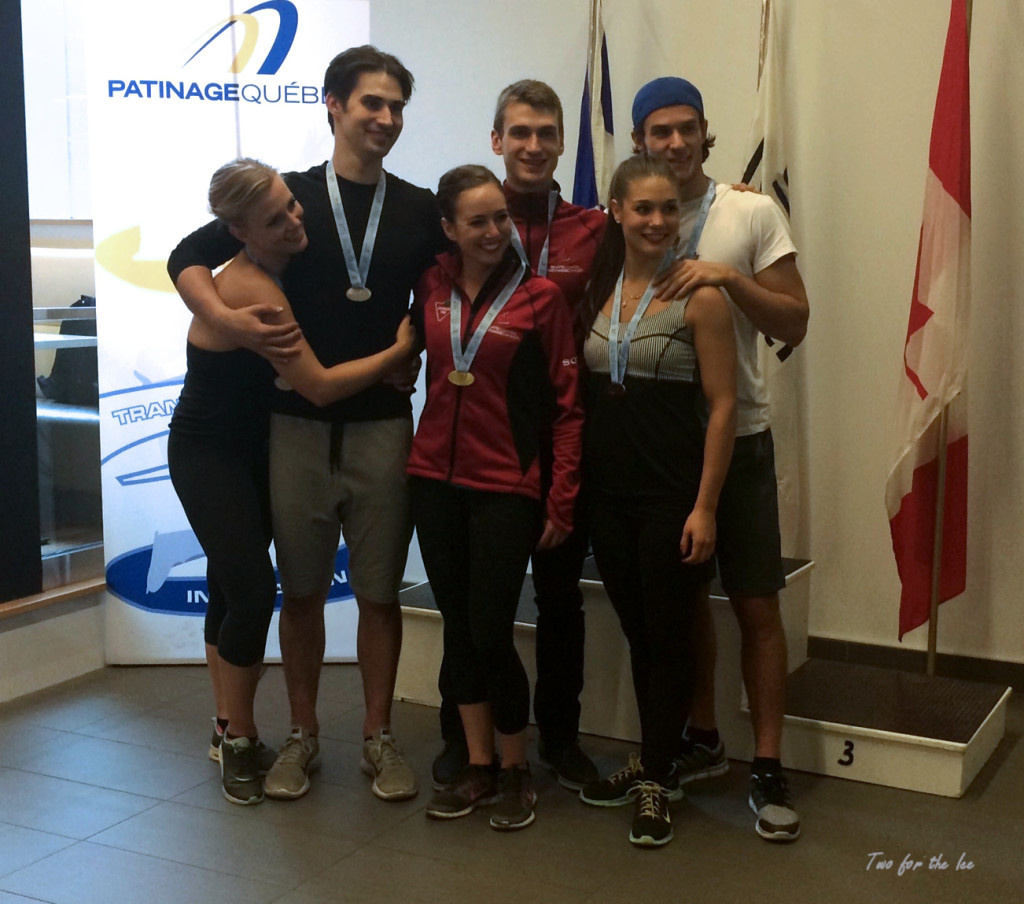by Jacquelyn Thayer
Though also well-represented in junior dance (discussed later), the senior dance event at the 2015 Quebec Summer Championships (Championnats québécois d’été 2015) in Pierrefonds was overwhelmed with entries from the Gadbois Centre — five of seven couples in each segment hailed from the school led by Dubreuil, Lauzon and Romain Haguenauer, and the camp swept the podium in both short and free dance.
With a strong summer score of 64.68 that included a rather mixed Level 1 and Level 4 on Ravensburger Waltz patterns, Alexandra Paul and Mitch Islam made a statement in their first event since moving to the Montreal camp, winning the short dance segment by the closest of margins over long-time training mates Madison Hubbell and Zach Donohue. Through nods to traditional movement vocabulary, the program, a classical ballet set to selections from The Tales of Beatrix Potter, takes advantage of Paul’s studio training.
Though initially entered in the free dance, the couple withdrew from the segment after embarking on revisions earlier in the week to, in Islam’s words, a “lyrical, powerful” program. In addition to assignments to Skate Canada International and NHK Trophy on the Grand Prix, they’ll make their international start at next month’s Nebelhorn Trophy, their third trip to an event where in 2013, they took bronze.
Finishing a close second in free dance as well as short were Hubbell and Donohue, also tackling their first event since their own Montreal move. With a 64.64 in the short dance, a modern waltz to k.d. lang’s rendition of “Hallelujah” paired with some original orchestration, a one-point extended lift deduction made the final difference in placements. A dramatic free dance set to Daft Punk’s Adagio from Tron — a “dark program,” Donohue noted — scored 90.46, with good footwork levels but the combination spin, twizzles and straight line lift picking up only Levels 2 and 3.
“We’re really happy to get out and get feedback this early in the season, test our programs in a competitive environment,” said Hubbell. “We came in already knowing that we had some issues with lifts and timing in the music, so we didn’t want to hold off competing just because we knew we would maybe have some missing points or deductions. We feel like the scores weren’t really the important part of this event, but just the feeling of our programs, and I know that both Zach and I are passionate about the programs that we selected this year.”
That free dance, which, per Hubbell, continues to evolve in meaning, explores a connection between a lost soul and a mysterious figure.
“I come to him as the angel of death,” said Hubbell, “and we have kind of an evolution through the program of knowing each other, falling in love in a way with each other and kind of having that question of do I take him with me and does he die, or does he keep fighting?”
The team hopes to tackle at least one senior international prior to the Grand Prix, though are awaiting an official assignment.
Elisabeth Paradis and Francois-Xavier Ouellette played the event’s biggest game of musical chairs, moving from bronze in the short dance with low levels on their Ravensburger patterns to gold in the free. While pleased with their performances, both partners noted the challenges of an early season skate, from late in the skate weariness to technical rough spots.
“I think people liked [the free dance], so that’s what matters in the summer,” said Paradis. “And, you know, I missed the twizzles and some little technical stuff. It needs just more practice, but we’re happy about how we skated.”
Both programs continue to draw on a lyrical style that helped the team come to attention last season. The short dance, set to Anouk’s “Lost” and “Kill,” relates the story of a soldier’s imminent departure for war. “The first part of the program, it’s like the last waltz together,” said Ouellette. “And then he really decides it’s time to go, so she is a little bit disappointed in that.”
“We were trying to give a story to our short because we feel a lot of short dances are just waltz, foxtrot, waltz, march, but we’re really trying to make people get some feeling when they watch the short,” said Paradis.
A free dance using Simon & Garfunkel’s “Bridge Over Troubled Water,” meanwhile, takes a more thematic than narrative angle, highlighting the idea of a friendship. But while emotion has served the couple well to date, they’re especially focusing their energies this season on improving the basics — stronger connection and dance hold, solid knee action and ankles. “We always get the good levels, we always get the technical points, but that Skating Skills part, that’s what we need to work on,” said Paradis.
With one To Be Announced spot remaining at Skate Canada International, the team, not assigned to any other events, remain uncertain about their status for the Grand Prix, but will be competing at next month’s U.S. International Figure Skating Classic in Salt Lake City — where they’ll also aim to establish the technical minimum score of 29.00 for Worlds, their ultimate season’s goal.
Denmark’s Laurence Fournier Beaudry and Nikolaj Sørensen, who sat out the short dance — with a program still under construction — took bronze in the free dance with a fluid skate to Shawn Phillips’ “Woman.” While they had the segment’s second-best technical score of 44.92, program components scoring lagged.
“We talked in the room just before, saying that we wanted really to bring the emotions on the ice and not only to skate,” said Fournier Beaudry, “because I know in the beginning of the season there’s always some technical stuff that are not working, and I think we did pretty much our best for what we could in the time that we had, that we were training for, so we’re happy.”
“For us what’s important this early, and what’s really, I think, the toughest to learn is how to leave an impression, leave the people that were watching a feeling they can take home, because in the end, we think that the spectators don’t really remember the technical stuff,” said Sørensen.
Despite the expected stresses of tackling an early first competition run-through, the two were happy with the outcome. “This is the best first competition we’ve ever done,” said Sørensen.
The couple will be joining their training mates in Salt Lake City, and in early October tackling either Finlandia Trophy or Ondrej Nepela — they’ll make a final decision later — before taking on their first Grand Prix assignment at Skate Canada International.
With a pair of powerful skates and a strong sense of musicality, France’s Marie-Jade Lauriault and Romain Le Gac, also students at Gadbois, captured gold in both short and free dance segments of the junior dance event with a four to five point edge in each. A modern-leaning free to the LOVE version of the Beatles’ “While My Guitar Gently Weeps” and “Come Together” earned 77.20, including Level 4s on every element but the step sequences though hit by an extended lift deduction. Presenting a contrast was a sweeping waltz to “And the Waltz Goes On,” a piece by Sir Anthony Hopkins first introduced to ice dance by Tessa Virtue and Scott Moir in the 2012-13 season. A score of 59.14 for that short dance came with Levels 3 and 4 on the Starlight Waltz. While the team competed at the senior level in their first season together of 2014-15, a move to juniors — they’re currently assigned to JGP Cup of Austria — may present additional opportunity to pick up international ranking points during the fall.
Silver in each segment went to Melinda and Andrew Meng, reigning Canadian junior bronze medalists who have trained at the Pierrefonds Sportplexe under Elise Hamel and Shawn Winter. In a short dance to Danse Macabre, the siblings achieved Level 4s on both patterns of the Starlight Waltz, finishing with a score of 54.00, while a flowing free to “Nocturne into Bohemian Rhapsody” picked up 72.98, with Level 2s on both footwork sequences and a Level 3 on the twizzles taking down the technical score a notch. The Mengs compete next at JGP Riga Cup.
Two couples traded places between short and free. Skating Coppelia, Valerie Taillefer and Jason Chan of Pierrefonds achieved 52.80 in the short dance, good enough for bronze, while Payten Howland and Simon-Pierre Malette-Paquette, accompanied by Novi’s Greg Zuerlein, finished fourth with a mark of 49.24 for an Addams Family waltz. Sunday’s free dance put Howland and Malette-Paquette on top, taking 72.40 for a Spanish medley to Taillefer and Chan’s 68.08 for a sophisticated fourth-place skate to selections from composer Wim Mertens. Taillefer and Chan will be appearing at next week’s JGP Bratislava, while Howland and Malette-Paquette are assigned to JGP Colorado Springs.
Rounding out the top five for both segments were Gadbois’s Kayla Charky and Simon Dazé. A classy “Piano Man” waltz netted 45.94, while a bluesy free to Bill Withers’ “Ain’t No Sunshine” and Kanye West and Jay-Z’s “Otis” — the latter cut of which presented some challenges over a rink audio system — scored 61.42.
As with Minto, a number of couples at both levels here competed first at Lake Placid, with seniors Carolane Soucisse and Simon Tanguay — fourth in short and free dances here — bronze medalists at Lake Placid Ice Dance International, while Catherine Daigle-Roy and Dominic Barthe (fifth in Quebec short and free dances) finished seventh in that event and Elysia-Marie Campbell and Philippe Granger placed seventh in both segments in Quebec as well as in the free dance at the Lake Placid Ice Dance Championships. Eight of this competition’s junior couples competed at the Ice Dance Championships, with the Mengs finishing third in their short dance event and Howland and Malette-Paquette second in their group for the free dance.


